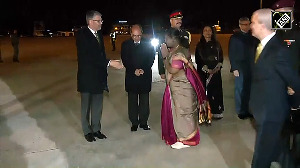Sunil Mittal, the chairman and group CEO of Bharti Enterprises, stressed at the World Economic Forum on India that the reserve price set by the government for the 2G spectrum auction was very high and if the poor response to the auction was hogging the limelight, this was the reason. The base price of 800 MHz has been fixed at 1.3 times that of 1,800 MHz, which is Rs 14,000 crore (Rs 140 billion) for five-MHz pan-India spectrum.
The base price of 800 MHz has been fixed at 1.3 times that of 1,800 MHz, which is Rs 14,000 crore (Rs 140 billion) for five-MHz pan-India spectrum.
The response of most telecom players to the ongoing auction has been subdued and the government is slated to garner substantially lower revenue from the spectrum auction this year than the targeted Rs 40,000 crore (Rs 400 billion).
There is unanimity among the industry and experts that the reserve price has been kept at a high level.
Mittal said, "We are supporters of the auction but the reserve price has to be balanced."
While speaking at the WEF session, 'Indian to Indian - Solutions to Transform India', he categorically stated, "have an open and transparent system for auction, but don't set the reserve price too high."
Taking part in the discussion, the Minister of State for Power (with independent charge), Jyotiraditya Madhavrao Scindia, pointed out that there was a vociferous debate on the spectrum auction today and a balance to the whole process would come with straight and clear-cut thinking.
Member of Parliament N K Singh agreed that any effort to balance the needs of industry and the government should keep the larger public good at the core.
"The theme must be congruity and balance for public good. Government needs to take the lead and each segment needs to take responsibility for its own sphere," Singh said, laying down the rules of the game.
From spectrum auction, the discussion then took a turn to the predominant topic of public discourse in the country currently - industry, politicians, civil society and media - everyone needs self-assessment in the light of all-round negativism.
Scindia began by stressing that the need was to focus on the positive aspects in all the segments, rather than harping only on the negative aspects.
Mittal, in conformity with Scindia, said, "there is far too much negativity", adding that India was successful because of a collection of small successes and these should be highlighted.
Singh said that everybody was under watch, adding that civil society was also being monitored.
With a consensus on the need for a shift from negativism to positivity, interesting propositions were thrown up on the issue of who should lead this.
Neelam Chibber, managing director, Industree/Mother Earth, said thought leaders were required to achieve this objective and stressed the need for inclusion of all segments of society in the policy-making discourse and profit-sharing.
Chibber
Mallika Dutt, president and CEO, Breakthrough, USA, highlighted the significance of the issue due to India's role on the global platform.
Dutt said that India was facing a challenge which required mature handling. "We have occupied a place in the global society, which is difficult," she said.
Mittal came out with a workable solution on who should guide the change in thinking.
"All four pillars need to come closer but not get too close. It has to be led by the political leaders. There is no bigger canvas than government, which can shape the destiny of the nation," he outlined.
Ruling out the repeat of the highly competitive bidding for the 3G and BWA (also known as 4G) spectrum in 2010, which went on for over a month fetching the government a total of Rs 1.06 lakh crore (Rs 1.06 trillion), Mittal said, "The auction will be over on the first day. There is no need to be aggressive."
The auction base price is more than seven times that the carriers paid in earlier sales where airwaves were bundled with telecom permits.
"We didn't want to be seen as boycotting auctions," Mittal responded when asked why then is his company taking part in bidding if the price is too high?
Airtel, Vodafone, Videocon and Tata Teleservices are among the telecom majors that have applied to bid in the auction, but Reliance Industries and Russia's Sistema surprised by staying away.
Chibber said that best practices should be set out for all the areas.
Scindia, however, identified passion as the most important factor behind who could be the best to lead the change to positive ambience.
"I assume that end game is successful. The person who has to lead it has to be most passionate about it with an approach that sets all the stakeholders on board," he said.
The underlying message from the session was clear: that there should be discussion and debate rather than confrontation and denouncing of one segment by another on policy issues.
All the participants agreed that the ongoing negativism was not going to help the country, and strong leadership was required to change track and remove the trust deficit.
The audience, however, didn't appear convinced of the current leadership, be it political or industry, being capable of ensuring a positive outcome.










 © 2025
© 2025